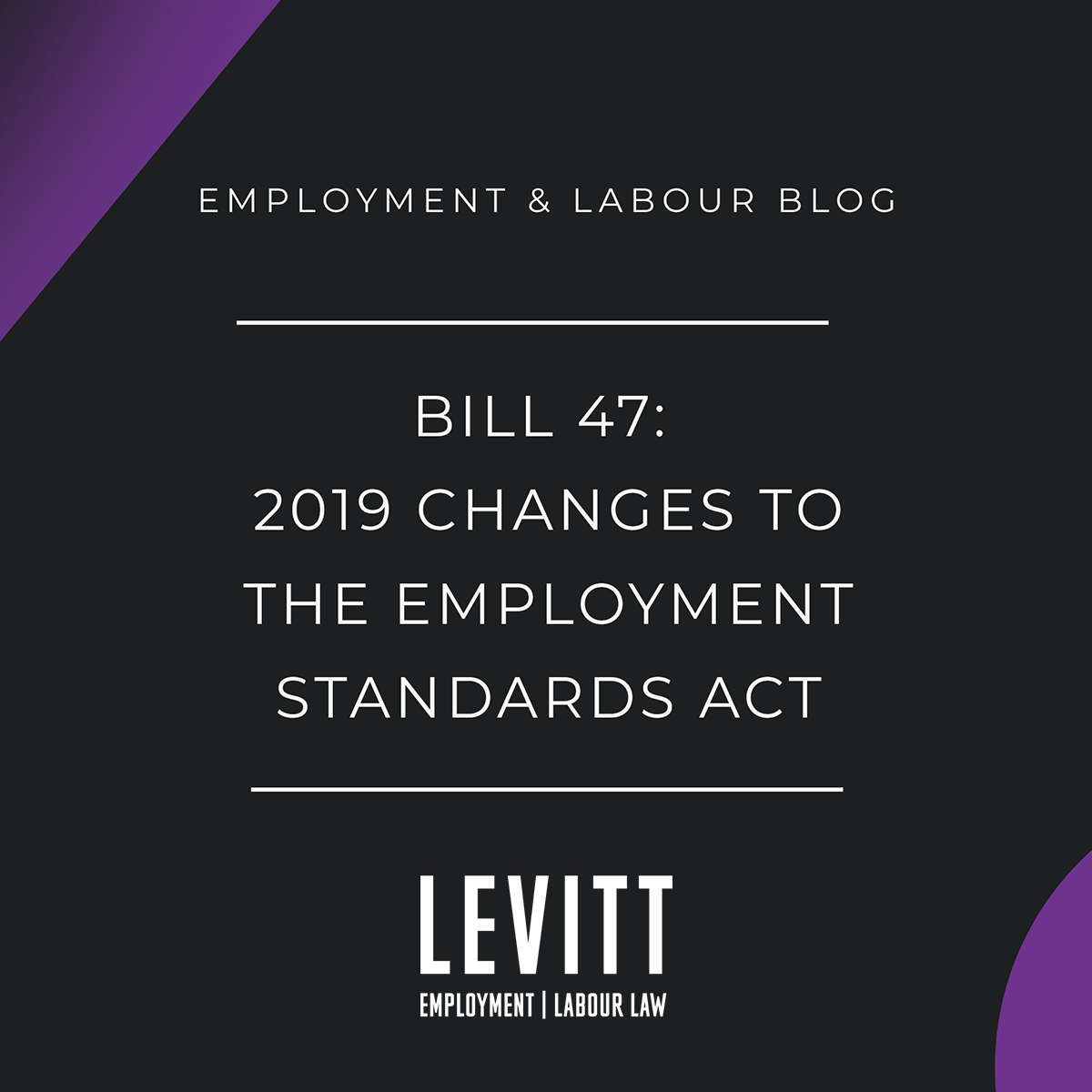On November 21, 2018, Making Ontario Open for Business Act, 2018, better known as Bill 47, received Royal Assent and came into force effective January 1, 2019. Although some provisions remained the same, the new Act extensively repealed the Fair Workplaces, Better Jobs Act, 2017, also known as Bill 148, that was previously passed by the Liberal government. Below are the key changes to the Employment Standards Act (ESA) as well as what has remained unchanged.
Minimum Wage
The previous Liberal government was planning to increase the minimum wage from $14 per hour to $15 per hour and implement special minimum wage rates for students ($14.10), liquor servers ($13.05), and homeworkers ($16.05). Under Bill 47, however, the current Progressive Conservative government froze the minimum wage at $14 per hour for two years, with adjustments to inflation each year effective October 1, 2020. Beginning in October 2020, the minimum wage will rise to $14.25.
Personal Emergency Leave (PEL)
Previously, all employees in Ontario, regardless of the size of the workplace, were entitled to ten days of unpaid personal emergency leave (PEL) per calendar year, and workers who have been employed for more than a week were also entitled to two paid PEL days. Since Bill 147 came into force, employers are no longer obliged to offer any paid PEL days. Instead, employers are required to provide employees, who have been employed for at least two weeks, with up to eight unpaid PEL days, comprising three “sick leave” days (i.e. personal injury, illness, or medical emergency), three “family responsibility leave” days (i.e. personal injury, illness, or medical emergency matter concerning prescribed family members), and two “bereavement leave” days (i.e. death of family members).
Whereas employers were formerly not allowed to ask for medical notes, the new bill now permits employers to require employees to provide “evidence reasonable in the circumstances”, which can include medical notes, to verify a need for PEL days.
Misclassification
Formerly, employers were not allowed to treat someone who is properly considered an employee as a contractor, and the onus was on the employer to prove that a particular individual was not an employee. Employers are still not permitted to misclassify employees, but the reverse onus has been repealed. Now, it is the individual who must prove that they are in fact an employee.
Scheduling
Many employers, especially those in the retail and food services industries, expressed challenges concerning the onerous scheduling obligations under the previous Bill 148. The government repealed the following rules that previously existed:
- Employees could refuse to work or be on-call if they were scheduled with less than 96 hours’ advance notice;
- Employees could request scheduling changes or changes to work location after 3 months of working;
- Employees were guaranteed minimum pay of three hours if they were available to work but worked less than three hours; and
- Employees had a right to shift cancellation pay of three hours if a shift got cancelled within 48 hours of the start of the shift.
Moreover, employers are no longer required to keep record of the above scheduling changes.
Equal Pay for Equal Work
Previously, employers were prohibited from paying part-time, casual, or temporary workers at a lower rate than full-time or permanent workers, where (1) the employees performed substantially the same kind of work in the same establishment; (2) their performance required substantially the same skill, effort, and responsibility; and (3) they worked under similar working conditions. This “equal pay for equal work” provision as it relates to employment status has been repealed and is no longer applicable.
Employers are also no longer required to provide a review of an employee’s pay rate.
Public Holiday Pay Calculation
Under Bill 148, employers had to divide regular wages earned in the period prior to the holiday by the number of days worked in calculating Public Holiday Pay. The new bill scrapped this formula and returned to the formula used pre-Bill 148. Employers now have to add total regular wages payable during the four weeks before the week of holiday and any applicable vacation pay, then divide the sum by 20.
What Stayed the Same
The following provisions have remained in effect:
- Employees with less than five years of service are entitled to a minimum of two weeks of paid vacation, and employees after five years of employment are entitled to three weeks of paid vacation;
- Employees are entitled to expanded statutory leaves of absence such as domestic and sexual violence leaves;
- Pay differentials based on sex are prohibited; and
- Employers must pay employees for 3 hours of work if an employee regularly works for three or more hours per day and is required to report to work but works less than three hours.
Other Changes Made
Bill 47 also introduced changes to other legislation, notably the Labour Relations Act and the Ontario College of Trades and Apprenticeship Act.
Concluding Remarks
Bill 47 signals the current Ontario government’s pro-business agenda, and many employers have found it a welcome step. Employers have been advised to review any policies and employment contracts to ensure that they comply with Bill 47. Despite the changes in the law, some employers have retained some of the entitlements their employees were granted under Bill 148. For instance, some employers have kept their scheduling policies the same in response to some workers feeling that their scheduling security under Bill 148 was eliminated after Bill 47 came into effect. Both employers and employees should understand their rights and obligations based on the currently effective Bill 47 and mutually determine whether it makes sense to revert to Bill 148 standards.
Disclaimer
Remember, this bulletin provides only general information and is not a substitute for legal advice. If you have a legal problem, you should seek out legal advice before making any decisions. The fact that you have received this bulletin from Levitt LLP or have communicated with members of Levitt LLP does not create a lawyer-client relationship.

